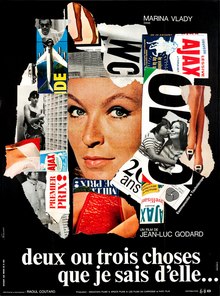Two or Three Things I Know About Her
| Two or Three Things I Know About Her | |
|---|---|
 |
|
| Directed by | Jean-Luc Godard |
| Produced by |
Anatole Dauman Raoul Lévy |
| Written by |
Catherine Vimenet Jean-Luc Godard |
| Starring |
Joseph Gehrard Marina Vlady Roger Montsoret |
| Distributed by | New Yorker Films |
|
Release date
|
17 March 1967 (France) |
|
Running time
|
87 min |
| Language | French |
Two or Three Things I Know About Her (French: Deux ou Trois choses que je sais d'elle) is a 1967 French film directed by Jean-Luc Godard, one of three features he completed that year. Like the other two (Week End and La Chinoise), it is considered both socially and stylistically radical. Village Voice critic Amy Taubin considers it one of the greatest achievements in filmmaking.
The film does not tell a story so much as present an essay-like study of Godard's view of contemporary life; Godard wrote that "I wanted to include everything: sports, politics, even groceries. Everything should be put in a film". Godard himself narrates the film in a whispered voice-over that discusses his fears to the audience about the contemporary world, including the Vietnam War. The film often cuts to various still shots of bright consumer products and ongoing construction.
Like many of the director's works, the film does not follow the narrative arc of conventional cinema, with an introduction, conflict and resolution. Instead, it presents 24 hours in the sophisticated but empty life of Juliette Jeanson (Marina Vlady), a seemingly-bourgeois married mother, part of whose life involves prostitution. Juliette begins her day dropping off her screaming child to a man who has a flourishing business doing childcare for call girls. Her generally uneventful daily routine of shopping, housework and child-rearing is interspersed with assignations with clients. All of the film's sexual interplay is banal instead of erotic, and one client, an American wearing a shirt with his country's flag, demands the women he has hired wear airline shopping bags over their heads.
Though there was a script, there are many moments in which the cast breaks the fourth wall, looking into the camera and giving seemingly random monologues about what they think about life and themselves. Vlady and other actors wore earpieces through which the director would ask surprise questions, often catching Vlady off-guard because she was required to give spontaneous answers that were appropriate to her character.
...
Wikipedia
